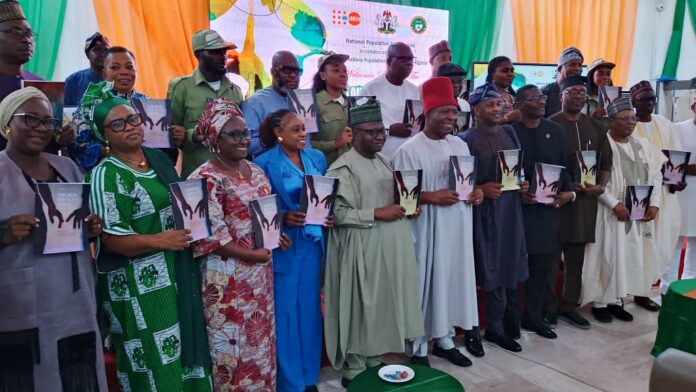By Joel Ajayi
The Chairman of the National Population Commission (NPC), Hon. Nasir Isa Kwarra, has called for a major shift in Nigeria’s population policy—from merely focusing on fertility rates to tackling the structural inequalities that shape reproductive choices.
Kwarra made this call on Tuesday in Abuja during the official launch of the 2025 State of the World Population (SWOP) Report, presented in collaboration with the United Nations Population Fund (UNFPA).
Delivering his address at the event, themed “The Real Fertility Crisis: The Pursuit of Reproductive Health Agency,” Kwarra noted that the report presents more than just global statistics—it serves as a wake-up call to reflect deeply on human development and the lived realities behind demographic figures.
“Fertility is often discussed in numbers—how many children are born, how fast populations are growing. But behind each number is a story: a woman, a family, a future,” he said. “The real crisis is not just about whether people are having more or fewer children, but about their ability to make those decisions freely and safely.”
He emphasized that millions of Nigerian men and women continue to face barriers—ranging from poverty, poor healthcare access, and gender inequality to inadequate data—that prevent them from exercising reproductive autonomy.
Highlighting key findings from the 2023–2024 Nigeria Demographic and Health Survey (NDHS), Kwarra revealed that Nigeria’s national Total Fertility Rate (TFR) has declined from 5.3 to 4.8 children per woman. Despite this progress, adolescent fertility remains a major concern, with 15% of girls aged 15 to 19 already pregnant or having begun childbearing.
The modern contraceptive prevalence rate among married women has risen slightly to 15%, still well below the national target of 27% by 2030. Meanwhile, the unmet need for family planning has increased to 21%, underscoring major gaps in both service delivery and access.
“These figures are not just statistics,” Kwarra said. “They represent the reality of young girls forced into early motherhood, of women unable to space or limit pregnancies, and of families trying to make choices without adequate support.”
He added that the problem is not unique to Nigeria. Globally, fears of population decline are growing, yet millions still cannot have the number of children they want—when and how they want—due to structural and systemic barriers.
The NPC boss reiterated the critical role of accurate data in addressing these issues. He reaffirmed the Commission’s commitment to producing credible, inclusive data—especially through the upcoming National Population and Housing Census—to inform people-centered, rights-based policies.
“The shift we seek must move away from population control toward reproductive empowerment. From top-down policymaking to bottom-up agency. From fear-based messaging to policies that affirm dignity and freedom,” he said.
Kwarra stressed that this transformation is not just about upholding human rights—it’s also a smart development strategy.
“When individuals can make informed decisions about their reproductive lives, they are more likely to invest in education, health, and their communities. Empowered choices lead to empowered societies.”
He urged all stakeholders—government agencies, development partners, civil society, faith-based organizations, the private sector, and the media—to work together to remove the barriers hindering reproductive autonomy.
“As we reflect on the findings of this report, let us commit to building a Nigeria where every woman and man, every girl and boy, has the freedom and means to shape their reproductive journey—free from coercion, discrimination, or fear,” Kwarra concluded.
The SWOP 2025 report ultimately underscores a growing global consensus: that investing in reproductive rights and health is not only a matter of justice, but a vital step toward sustainable national development.
In his addressed the Chairman, Senate Committee on Population, Sen. Victor Umeh, cautioned against legislative attempts to control births, saying education should be the focus instead.
“Some countries, like China, have tried this and it is not helping them much,” he said.
He called for sex education for girls, to help them understand their reproductive cycles and take control of their fertility.
On the postponed National Population and Housing Census, Umeh said accurate population data was critical to national planning.
He said President Bola Tinubu had constituted a Presidential Committee to ensure a credible census is conducted soon.
He also assured that the National Assembly would give full support for the exercise.





